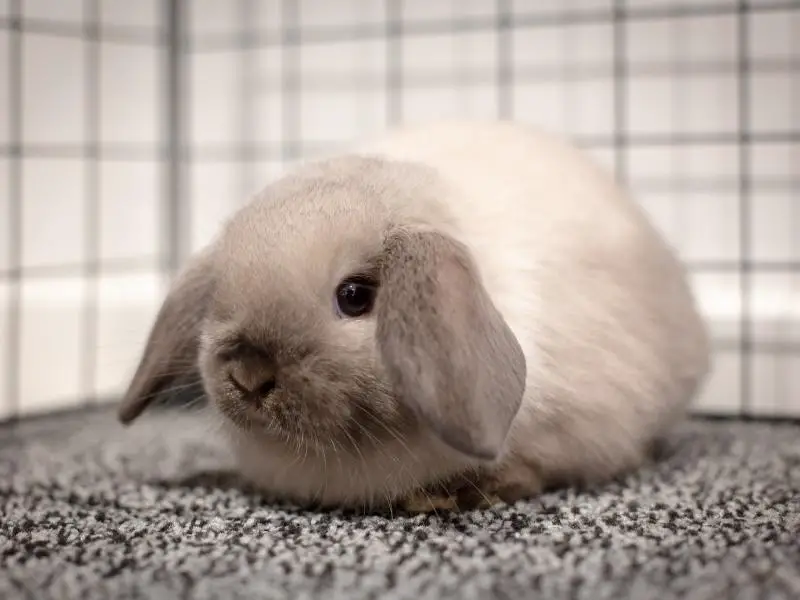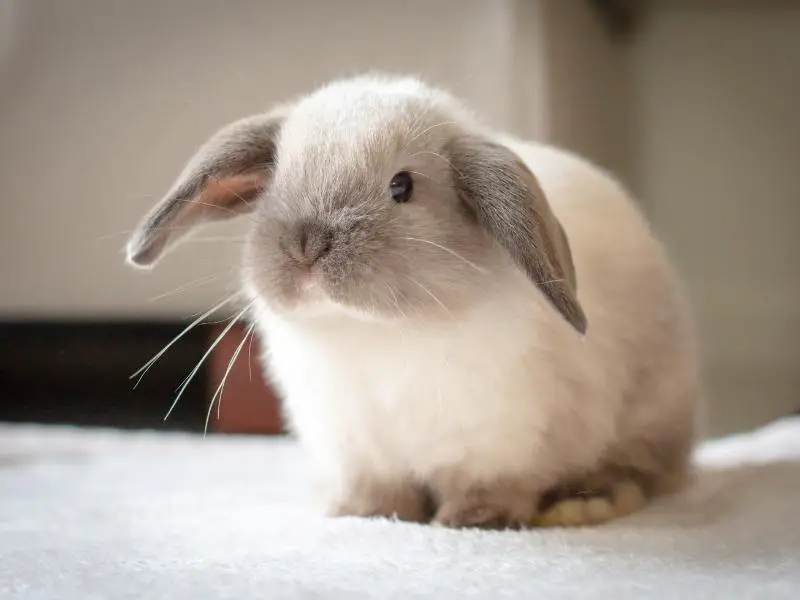Choosing the perfect Mini Lop bunny for your family can be overwhelming, especially considering health care requirements, living arrangements, dietary requirements, and temperaments. But what is the most important question of all?
How long is a Mini Lop’s lifespan?
Mini Lop rabbits have an average lifespan of 7 to 14 years, depending on their general health and well-being. A Mini Lop has a far longer lifespan compared to other breeds of rabbit, such as the Rex rabbit whose lifespan is only between 5 to 6 years.
If you want to learn more about Mini Lop rabbit care and its lifespan, then this detailed guide is just what you need.
How Long Do Mini Lop Rabbits Live?
Mini Lop rabbits have an average life expectancy of 7 to 14 years. Their lifespan greatly depends on their overall health, well-being, and age.
Let’s take a look at some of the Mini Lop breed information:
- Temperament: Typically a calm bunny with bursts of energy. They’re also very playful with an even temper.
- Species name: Oryctolagus Cuniculus
- Compatibility: These rabbits prefer to live in pairs.
- Fur colors: Chestnut, white, or brown to reddish-brown, blue, chocolate, black, smoke pearl, and seal.
- Body type: Small, fuzzy, and muscular bodies with stocky necks. Long rounded ears that hang downward.
- Weight: Weigh around 6.5 pounds. The buck (male rabbit) is larger than the doe (female).
Did you know? Miniature Lops are often confused with Holland Lops and Dwarf Lops.
The main difference between the Holland Lop and Mini Lop is the Mini Lop rabbit’s bodies are larger, and the Holland Lop has a larger head. Dwarf Lops are larger than Mini Lops.
Factors That Could Affect Life Expectancy of Mini Lop Rabbits

Your Mini Lop is a prey animal, which makes them sensitive to sudden movements and loud noises. Prey animals are susceptible to heart attacks caused by sudden fear.
Let’s take a look at some other factors that could affect the life expectancy of your Mini Lop rabbit:
Health Issues
Like any other rabbit breed, Mini Lops have sensitive digestive systems and are susceptible to several health issues that can be fatal such as:
- Dental issues like excessive tooth growth or tooth abscesses.
- Hairballs can cause intestinal blockage and lead to gastrointestinal stasis.
- A dirty living environment causes flystrike. Flies will lay their eggs on your rabbit’s fur, and the larvae will feed on your rabbit’s flesh.
Living Arrangements
Bunnies that live indoors have a longer lifespan than bunnies that live outdoors for the following reasons:
- Outdoor rabbits are easily affected by hot and cold weather changes.
- It’s easier for predators to harass and stress rabbits out when they have outdoor hutches.
- Outdoor bunnies are more likely to come into contact with bacteria and diseases when they live outside (mosquitos and ticks).
Sterilizing Your Mini Lop
Sterilizing your rabbit will increase its lifespan by up to 5 years.
Does (female rabbits) that are unspayed are more likely to develop ovarian or uterine cancer by age 4? Unneutered bucks (male rabbits) also have a higher chance of developing prostate cancer.
Your Mini Lop can be sterilized when they reach sexual maturity at around 6 months old.
How to Help Mini Lop Rabbits Live Longer
Let’s take a look at some helpful tips to ensure that your Mini Lop rabbit lives longer:
A Balanced Diet
A balanced diet is key when it comes to the well-being of your Mini Lop. Ensure your bun’s diet consists of the following:
- 70% Timothy grass hay
- 5% good-quality pellets (ideally have a fiber content of at least 15% and less protein than fiber)
- 10% fresh fruit and vegetables (make sure to provide a variety)
- 0-5% treats
Top Tip: Regarding treats and pellets, stay away from the store-bought kind that contains dried fruit, corn kernels, nuts, grains, and colored pieces. This pet food has a high sugar and salt content.
Here’s a list of some food that is toxic for rabbits and should be avoided:
- Breakfast cereals
- Broccoli
- Cabbage
- Chocolate or sweets
- Corn
- Milk
- Nuts
- Oats
- Pasta
- Wheat
- Aloe plants
Regular Grooming
Bunnies are very clean animals, and they groom themselves multiple times a day. Your bun will lick its fur to remove any loose or dead fur. Unfortunately, during this grooming process, your bun will ingest some of the furs.
Rabbits can’t vomit, and this can cause a blockage in their stomachs. Ensure that you groom your long-eared companion regularly to help remove the loose fur. Ensure they’re eating enough roughage as this will help them easily pass the ingested fur.
Living Environment
Your Mini Lop can live happily indoors or outdoors. Although, indoors does have a few more benefits, as your bun will be able to interact more with you.
Keep the following considerations in mind when setting up a hutch or enclosure for your rabbit:
- The hutch should have a sturdy design that can withstand weather elements (ensure it is water and draft-proof).
- The ideal size for a Mini Lop should be around 12 square feet, and they should be able to lie down fully stretched out. They must also be able to stand upright on their hind legs comfortably and hop three times in either direction.
- The hutch must be predator-proof and kept in the shade.
- If your bun free-roams are in your house, then bunny-proof your house, ensure they’re supervised, and give your rabbit a designated sleeping area.
- Provide mental stimulation for your bunnies, such as ramps, tunnels, toys, and boxes to chew and play in.
Whether you have your bun indoors or outdoors, you must spend a lot of time with them to create a healthy bond.
My Last Bunny Thoughts
These laid-back bunnies make excellent family pets and have lovely temperaments. You want your long-eared fluffy friend to live a long and happy life with you and your family.
Ensure your bun has a balanced and varied diet, mental stimulation, and plenty of time outside its enclosure with your family.
Rabbits can quickly become bored, and as a bunny owner, you must ensure that your bun has plenty of entertainment.
The best way to ensure your bun reaches its maximum lifespan is to adopt a friend to prevent them from becoming lonely and by sterilizing them.
Related Articles:

